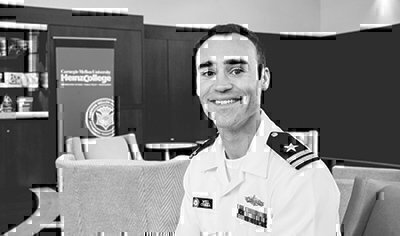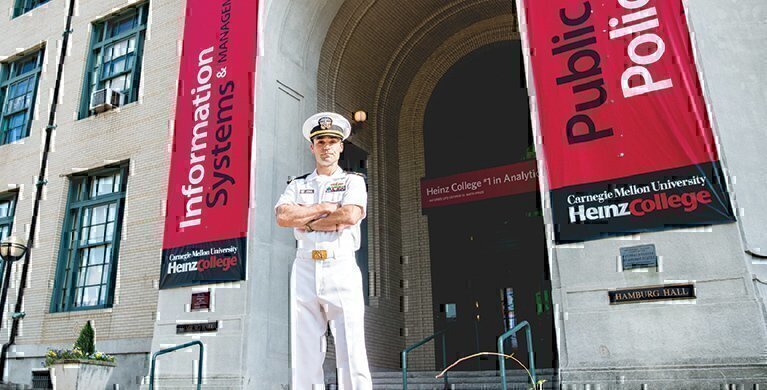*SPONSORED
Growing up in the Tennessee suburbs of Nashville and Memphis, Will Cunha set his sights on becoming a country music star. He and his brother would hold concerts in their home, decorating the stage, donning cowboy costumes and, like any good businessmen, charging admission.
Fortunately, Cunha also had other aspirations. “From an early age I had always had a strong desire to serve in the Navy,” he says. Through positive influences, including his Scout leaders, he aimed to attend the Naval Academy in Annapolis, Md. After interviews, applications, essays and waiting, Cunha received the “thin” letter – a rejection – for the class of 2010. He instead attended his father’s alma mater, the University of Missouri – Columbia, and participated in the Navy ROTC program.
“I thoroughly enjoyed the school and made some great friends, but halfway through decided I wanted to give the academy another shot,” he recalls. “My chain of command was very supportive of the notion and with the help of them, my parents and mentors, I re-applied and was admitted into the Class of 2011 at the Naval Academy.”
Many of his mentors were former military pilots, so Cunha made flying his initial goal. After seeing what the Navy offered, however, he was drawn to the challenge of being a division officer and serving on a ship.
Much as he loved serving on a destroyer and cruiser and camaraderie associated with service, including his highlight of hunting for submarines in the South China Sea, in 2016 he chose to separate from active duty. “In every junior officer’s career there comes the ‘decision time’ about whether to stay for another few years or get out,” he says. “As someone who always wanted to be in the Navy this was a very tough decision. I spoke with my commanding officer about it many times and explained I wanted to go back to school and further my education with a focus on cybersecurity. Most importantly, I wanted to go back to the classroom and surround myself with others who had a passion for learning. Ultimately, I felt the best decision was for me to part ways with active duty and start a new chapter.”

Carnegie Mellon University in Pittsburgh turned up in Cunha’s research as having a great cybersecurity program. Cunha, age 29, cites the program as having the perfect balance between technical and non-technical education. CMU also participates in the Scholarship for Service Program, a grant-based opportunity sponsoring students’ education with a requirement for government service within the cyber field upon graduation. The scholarship was important for Cunha; he was not eligible for the GI Bill because he attended the academy and transitioned to the Reserve within five years.
Acclimating to the classroom after five years away is not without its challenges. “It’s taken time to get back into the habit of studying for tests, taking notes and just being a student,” he says. He draws upon his military experience to surmount those hurdles and succeed.
“Being in the military taught me how to manage my time, prioritize the multiple tasks in front of me and ensure I put 100 percent effort into everything I do,” he says. “In addition, the discipline instilled in me the Naval Academy taught me the importance of the ‘little things,’ such as making class on time, getting to know your instructors or asking for help when needed. I try to approach my academics like I did my job as an officer, not just viewing from the next assignment or project as a check in the box to get me one step closer to graduating, but as an opportunity to learn and better prepare myself for the career ahead.”
He hopes his pending career will be a job with the government that lets him tackle the most pressing problems facing the country in the cyber domain. “We have to understand the technology we have in order to best deploy it,” Will says. “With everything from washing machines to power plant generators connected to a global Internet, there are ‘smart devices’ that are bringing real-world threats into our everyday lives. Physical luxuries are becoming more and more affected by cyber influences. We as Americans enjoy the multiple benefits that come from advances in technology, but might not appreciate the threat that could be potentially involved with that luxury.”
After leaving active duty, Cunha continued his service with the Navy Reserve and was selected for a job in the Pentagon; he currently is serving in OPNAV N9, specifically assigned to the surface warfare community. He routinely drills with a Reserve unit in Pittsburgh, which has been supportive of his school and Navy commitments. In addition, Cunha has a paid internship with the Computer Emergency Response Team (CERT) Division at the Software Engineering Institute, which is based at CMU. There he helps develop training products for government customers who are looking to build their cybersecurity workforce.
Cunha, who shares a home with his Golden Retriever, Oscar, advises transitioning military who are applying to school to “adequately, but appropriately, represent your previous service.” He also advises taking the time to research and understand the benefits and programs available to veterans.
He advises all transitioners to weigh what getting out of the military will entail. “When decision time comes around, do not let the ‘unknown unknowns’ of life outside of the military be the motivating factor for your decision,” Cunha says. “It can be intimidating to make such a big change and not necessarily know if you will have a steady paycheck or access to insurance and health care when needed, but the desire to pursue something different is powerful enough. Trust things will work out and you made the right decision. There will be challenges and unexpected obstacles ahead, but knowing you are chasing your dreams will make it all worth it.
“Lastly, don’t underestimate the power of networking. Ensure you follow up conversations with a hand-written note and respond to emails or phone calls you had with people trying to help. That sense of appreciation and professionalism will help leave an impression on people that could open doors you don’t even know are available.”
Grad Student Veteran
Will Cunha
Degree pursuing:
Masters of Science in Information Security Policy and Management
Carnegie Mellon University Heinz College
Expected graduation: May 2018
Age: 29
Branch: Navy (2011-2016)
Navy Reserve (2016-Present)
Rank: Lieutenant (O-3)
Designator: Surface Warfare Officer
Other degree and certifications:
Bachelor of Science, Information Technology, United States Naval Academy, 2011, and Eagle Scout
*This post is sponsored by Carnegie Mellon University, a paid client of Victory Media and G.I. Jobs.






